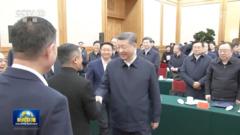Ma's recent public appearance hints at a shift in government attitudes toward the tech sector, sparking optimism among analysts and investors.
Jack Ma's Resurgence: A Game-Changer for China's Tech Landscape?

Jack Ma's Resurgence: A Game-Changer for China's Tech Landscape?
The return of Alibaba's founder Jack Ma rekindles discussions on China's tech policies and economic outlook.
Jack Ma’s re-emergence into the public eye has stirred excitement within China’s business community, following his hiatus after a series of comments that criticized the nation’s financial sector. The Alibaba founder attended a pivotal symposium with President Xi Jinping and other tech titans, marking a significant moment for China’s economy and the tech industry as a whole.
Market responses to Ma’s reappearance have been overwhelmingly positive. Following the symposium, stocks for technology companies, particularly Alibaba, saw a notable surge. Alibaba’s stock ended up 8% higher after an impressive earnings report that exceeded analysts’ predictions. The company's stock price has appreciated 60% year-to-date, suggesting a growing investor confidence linked to Ma’s presence.
Analysts have been keenly observing the implications of Ma's attendance, especially considering his front-row seating next to key leaders, signalling a form of rehabilitation from the public shunning he faced post-2020. After criticizing state-owned banks, his company’s IPO ambitions were derailed, leading to a broader crackdown on the tech sector. However, experts believe that Ma's reappearance at Xi’s event indicates a potential thawing of relationships between authorities and entrepreneurs.
Responses from social media users have also been supportive, seeing Ma’s return as a beacon of hope for the economy. His progress from being sidelined to sharing a platform with top business figures suggests a changing narrative within China regarding its tech giants. Analysts speculate that the event represents a strategic pivot towards greater support for private enterprises, aligned with national priorities for economic innovation and independence.
Xi’s remarks at the symposium encouraged private businesses to innovate and contribute to the economy, contrasting with previous years of regulatory scrutiny. The broader context shows that while Ma's return is promising, the government still seeks to align economic growth with its political objectives, emphasizing areas like high-end industries and technology.
The recent development in AI technology, represented by DeepSeek’s success, may also factor into the renewed collaboration between the government and tech firms. The rapid rise of this Chinese AI chatbot has generated nationalistic sentiments and bolstered investment into tech stocks, further indicating a shift in focus.
Some analysts argue that this meeting and Ma's presence imply that Beijing is moving toward a more controlled engagement with the tech sector, rather than a return to unrestrained growth. The implications are clear — private enterprises must align with the government's goals for self-sufficiency and technological advancement as China aims for a more sustainable economic future.
Ultimately, Jack Ma's return could be a precursor to a more favorable environment for innovation and growth within China's tech landscape, although concerns about ongoing scrutiny and alignment with state priorities remain.
Market responses to Ma’s reappearance have been overwhelmingly positive. Following the symposium, stocks for technology companies, particularly Alibaba, saw a notable surge. Alibaba’s stock ended up 8% higher after an impressive earnings report that exceeded analysts’ predictions. The company's stock price has appreciated 60% year-to-date, suggesting a growing investor confidence linked to Ma’s presence.
Analysts have been keenly observing the implications of Ma's attendance, especially considering his front-row seating next to key leaders, signalling a form of rehabilitation from the public shunning he faced post-2020. After criticizing state-owned banks, his company’s IPO ambitions were derailed, leading to a broader crackdown on the tech sector. However, experts believe that Ma's reappearance at Xi’s event indicates a potential thawing of relationships between authorities and entrepreneurs.
Responses from social media users have also been supportive, seeing Ma’s return as a beacon of hope for the economy. His progress from being sidelined to sharing a platform with top business figures suggests a changing narrative within China regarding its tech giants. Analysts speculate that the event represents a strategic pivot towards greater support for private enterprises, aligned with national priorities for economic innovation and independence.
Xi’s remarks at the symposium encouraged private businesses to innovate and contribute to the economy, contrasting with previous years of regulatory scrutiny. The broader context shows that while Ma's return is promising, the government still seeks to align economic growth with its political objectives, emphasizing areas like high-end industries and technology.
The recent development in AI technology, represented by DeepSeek’s success, may also factor into the renewed collaboration between the government and tech firms. The rapid rise of this Chinese AI chatbot has generated nationalistic sentiments and bolstered investment into tech stocks, further indicating a shift in focus.
Some analysts argue that this meeting and Ma's presence imply that Beijing is moving toward a more controlled engagement with the tech sector, rather than a return to unrestrained growth. The implications are clear — private enterprises must align with the government's goals for self-sufficiency and technological advancement as China aims for a more sustainable economic future.
Ultimately, Jack Ma's return could be a precursor to a more favorable environment for innovation and growth within China's tech landscape, although concerns about ongoing scrutiny and alignment with state priorities remain.



















